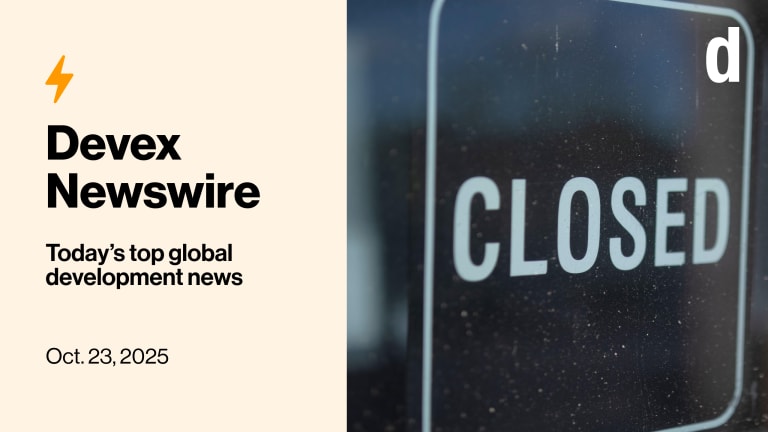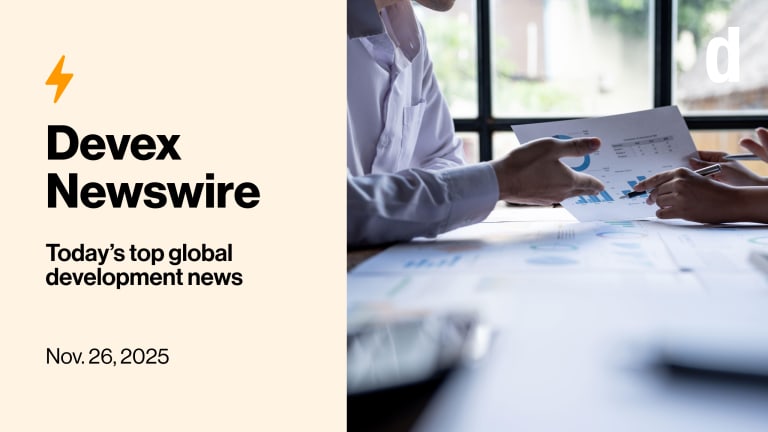
As the dangers of climate change have increased, so have the perils of being an environmental activist, according to a new report.
+ Join Us: This morning at 9 a.m. ET (3 p.m. CET), Devex and the Hilton Foundation are partnering for a virtual prize ceremony as CAMFED, or the Campaign for Female Education, wins the 2021 Conrad N. Hilton Humanitarian Prize. Save your spot here.
This is a preview of Newswire
Sign up to this newsletter for an inside look at the biggest stories in global development, in your inbox daily.
2020 was the deadliest year on record for environmental activists, with 227 documented murders, according to a Global Witness report — and more believed to have gone unreported.
It is extremely dangerous to be an environmental activist in 2021, Steve Trent, CEO at the Environmental Justice Foundation, told Devex in an email. “And as the scramble for resources intensifies under the climate and biodiversity crises, there is every reason to think it will get worse,” he said.
The last four years have been the hottest on record and the frequency of extreme weather events have increased. More and more people around the globe are joining the fight against climate change — but Trent said that Indigenous activists and others “who are standing in the way of corporate profits by defending their local environment” face the greatest risk of violence.
Of the activists killed last year, over a third were Indigenous people and the majority of murders happened in Latin America. Colombia had the highest number of activist deaths — and in Mexico, up to 95% of the killings have gone unprosecuted.
Read: What can stop environmental activism from being so deadly?
Alarm bell
The International Monetary Fund has downgraded its growth projections for the year slightly and is warning of a “dangerous divergence” in global economic prospects. Low-income countries are facing the worst projections, my colleague Shabtai Gold reports.
“The outlook for the low-income developing country group has darkened considerably due to worsening pandemic dynamics,” according to IMF’s World Economic Outlook, released Tuesday.
In low-income countries, 96% of populations remain unvaccinated against COVID-19, driving the worsening outlook. IMF is calling this “the great vaccine divide” and urged vaccine manufacturers and high-income countries to step up efforts to produce more doses.
Read: IMF warns low-income countries face darkening economic prospects
Shabtai also reports that on Tuesday IMF provided its first unscripted reaction to the recent controversy surrounding Managing Director Kristalina Georgieva amid allegations that she tampered with the rankings of the World Bank’s Doing Business report when she headed the bank. Both institutions are facing questions about their credibility in the wake of the crisis.
“I take it to heart that we have to strive always to demonstrate that what we do touches positively the lives of people,” Georgieva told reporters yesterday.
IMF Chief Economist Gita Gopinath also insisted the fund has a “robust system” in place to ensure the accuracy of its data. “We take data integrity very seriously,” she said.
Georgieva, who is scheduled to hold a press conference today for the IMF virtual annual meetings, has received the full support of the IMF board to stay in her post after a review. The Biden administration also has indicated that it won’t push for any leadership changes at the fund, according to a report from The New York Times.
However, some economists have questioned what this all means, with Timothy Ash at Blue Bay saying the fund’s credibility is “in tatters,” and that the Bretton Woods institutions are in a weaker position to argue for good governance around the world.
ICYMI: IMF chief warns lack of vaccines could cause $5.3 trillion global loss
Reliable source
A couple of our Devex colleagues have updated our guide to the Inter-American Development Bank’s monthly operational summary — which includes tips on how to parse the data yourself — with fresh data from the bank. Pro subscribers can browse our key month-by-month takeaways on the IDB’s 2021 project pipeline.
Explore: IDB’s interactive funding pipeline
+ Devex Pro subscribers can learn more about IDB’s top consultants. Not yet a Pro subscriber? Sign up now and start your 15-day free trial.
Stocking up
Gavi, the Vaccine Alliance has exercised its option to buy an additional 176.5 million doses of Moderna’s COVID-19 vaccine doses for COVAX. All doses are being sold at the lowest tiered price, with 116.5 million vaccine doses expected to be delivered in the first quarter of 2022 and another 60 million expected in the second quarter. COVAX also retains an option to buy an additional 233 million doses for delivery in the latter half of the year.
So far, only about a million Moderna doses have gone to low-income countries, according to The New York Times, while the company’s market value has close to tripled in 2021.
ICYMI: Moderna plans to build mRNA vaccine manufacturing plant in Africa
+ For more updates on COVID-19, and vaccine rollout and equity, sign up for Devex CheckUp, the must-read weekly newsletter for exclusive global health news and insider insights.
Northern exposure
Norway will further increase its foreign assistance to 41.9 billion Norwegian kroner ($4.9 billion) — four times more than other OECD donor countries, Jan Egeland, secretary-general of the Norwegian Refugee Council, tweeted Tuesday. We’ve reported before that Norway’s spending on development has grown significantly over the past decade. Our Pro subscribers can also learn more about the trends in Norwegian aid.
He’s back
Former U.K. Health Secretary Matt Hancock has been named a United Nations special representative and will focus on helping with Africa’s recovery from the pandemic. As the BBC notes, the appointment comes four months after Hancock resigned from his cabinet position for breaking COVID-19 social distancing rules by kissing a colleague.
In other news
At Tuesday's G-20 special summit on Afghanistan, the EU led other donors in announcing aid with a $1.1 billion pledge, while Japan promised $190 million, and China $30 million. [New York Times and NHK]
Chinese President Xi Jinping announced $233 million for a newly established biodiversity fund during yesterday's virtual U.N. conservation summit. [France 24]
The Asian Development Bank will ramp up its climate financing goal to $100 billion for 2019-2030, according to bank head Masatsugu Asakawa. [Reuters]
Shabtai Gold contributed to this edition.
Sign up to Newswire for an inside look at the biggest stories in global development.








